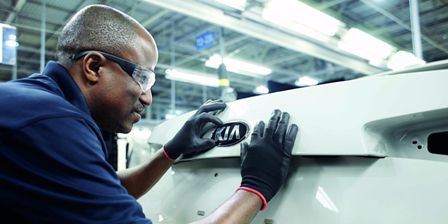…As Kia Nigeria GMD, Hathiramani Expresses Optimism
[dropcap]T[/dropcap]he dwindling sales of automobiles in Nigeria has continued to drive companies operations further into stalemate making their manufacturing plants a ghost of itself as a result of under-utilization and putting investors on the brink of exiting the country or changing their business portfolio in recent times.
The yearnings of the stakeholders had been tumultuous recently, thereby raising a myriad of concerns from economic experts chiefly as a result of the declining fortune of crude oil and the need to diversify the nation’s economy from a mono-economy to a diverse one with stream of revenues from all other sectors driven by local production and industrialization that will have direct impact on GDP and per capita income of the populace by providing employment for the teeming youths.
The salient reasons for the hues and cries of investors are not farfetched from the cash-strapped economy affecting the buying power of customers occasioned by the current recession.
The country’s chequered history of the influx of illegal importation of used cars, lack of sustainable and more importantly actionable policy framework amongst others had all been at the frontiers of edging local production from the market.
In a submission, Jacky Hathiramani, Group Managing Director, Kia Motors Nigeria, posited that the impact of the country’s business environment, operational overheads and recent economic recession have taken a great toll in the growth trajectory of the automobile industry.
However, he expressed hope in the current administration and their doggedness in sustaining the auto policy for a guaranteed industrialization of the economy vis-à-vis local production of automobiles in the country.
“As a player in the automobile industry,” the Kia boss pointed out, “we are not oblivious of the challenges inhibiting local production and the full realization of the gains of the auto policy.
“At Kia, we believe that, despite these daunting challenges, the government’s favourable disposition towards repositioning the auto industry at the centre of local production and Nigeria’s industrialization is laudable”.
Mr. hathiramany also lauded the recent appointment of Mr Jelil Aliyu as the Director General of National Automobile Development and Design Council (NADDC), saying he is best fit for the job.
“Following his local and international experience in the automobile industry,” he opined, “he’s a right peg in a right hole.”
He, therefore, expressed optimism that, with the new order in the council and the federal government’s support, the auto industry will be set on a path of sustainable growth.
He also urged the government to increase patronage of the locally produced vehicles thereby demonstrating their commitment to supporting made in Nigeria cars.
“Local production,” he said, “has remained a major index for the economic development and with the current dogged call by the federal government for the diversification of the economy, the auto industry is one of the driving sectors that can put Nigeria on the global map as one of the industrialised economies in the world over.

Hathiramani, therefore, appealed to the government to continue to lend its support to the industry by implementing the auto policy and a conducive business environment to foster the development of the economy through automobile manufacturing.
It will be recalled that Kia Motors Nigeria began its local production in the wake of the implementation of the auto policy in 2014. The company built an ultra-modern assembly plant in Lagos with a capacity to produce 27,000 units of vehicles per annum.
Locally producing cars to the exact standard of Kia Motors Corporations in Korea, Kia Motors Nigeria currently produces the cars locally and the newly launched Sorento, Sportage and Optima are all produced in its plant in Lagos.




